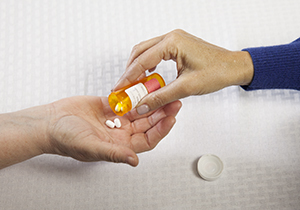Treating Post-Traumatic Stress Disorder (PTSD) with Medicine
Treating Post-Traumatic Stress Disorder (PTSD) with Medicine
Post-traumatic stress disorder (PTSD) can happen after you go through a severe trauma. This may include physical abuse, rape, a natural disaster, a car accident, the death of a loved one, or military combat. Symptoms of PTSD involve intense anxiety that keeps coming back. Nightmares, intrusive memories, and flashbacks (vivid memories that seem real) related to the trauma may also occur. But you don’t have to suffer anymore. Treatment is available. Along with therapy (also called counseling), medicine may help manage your symptoms.
Medicines
Certain medicines may be prescribed to help relieve your symptoms. As a result, you may feel less anxious or depressed. You may also feel able to move forward with therapy. At first, medicines and dosages may need to be adjusted to find what works best for you. Try to be patient. Tell your doctor how a medicine makes you feel. This way, you can work together to find the treatment that’s best for you. Keep in mind that medicines can have side effects. Talk to your doctor about any side effects that are bothering you. Changing the dose or type of medicine may help. Don’t stop taking medicine on your own because it can cause symptoms to come back.
Anti-Anxiety medicine: This medicine relieves symptoms and helps you relax. Your doctor and pharmacist will explain when and how to use it. It may be prescribed for use before entering situations that make you anxious. Or, you may be told to take it on a regular schedule. Anti-anxiety medicine may make you feel a little sleepy or “out of it.” Don’t drive a car or operate machinery while on this medicine, until you know how it affects you.
Caution
Never use alcohol or other drugs with anti-anxiety medicine. This could result in sedation, lack of muscular control, coma or death. Also, use only the amount of medicine prescribed to you. If you think you may have taken too much, get emergency care right away.
Antidepressant medicine: This kind of medicine is often used to treat anxiety, even if you aren’t depressed. An antidepressant alters the levels of brain chemicals. This helps keep anxiety under control. This medicine is taken on a schedule. It takes a few weeks to start working. If you don’t notice a change at first, you may just need more time. But if you don’t notice results after the first few weeks, tell your doctor.
Keep taking medicines as prescribed
Never change your dosage or stop taking your medicine without talking to your doctor first. Keep the following in mind:
Some medicine must be taken on a schedule. Make this part of your daily routine. For instance, always take your pill before brushing your teeth. A pillbox can help you remember if you’ve taken your medicine each day.
Medicines are often taken for 6 to12 months. Your doctor will then decide if you need to keep taking them. Many people who have also had therapy may no longer require medicine to manage anxiety.
You may need to stop taking medicine slowly to give your body time to adjust. When it’s time to stop, your doctor will tell you more.
If symptoms return, you may need to start taking medicine again. This isn’t your fault. It’s just the nature of your anxiety disorder. If symptoms return, seek care as soon as possible. If symptoms return, seek care as soon as possible.
Special concerns
Side effects: Medicines may cause side effects. Ask your doctor or pharmacist what you can expect. They may have ideas for avoiding some side effects.
Sexual problems: Some antidepressants can affect your desire for sex or your ability to have an orgasm. A change in dosage or medicine often solves the problem. If you have a sexual side effect that concerns you, tell your doctor.
Addiction: If you have history of addiction, you may need to avoid certain medicines. Be honest with your provider about any past history of drug use. This will ensure that you receive the safest possible medicines for your PTSD symptoms. Anti-anxiety medicine carry a risk of addiction, and no matter the reason for medicine or the type of drug, your provider will want to prescribe medicines based on a complete knowledge of your medical history.
Resources
National Institute of Mental Health
www.nimh.nih.gov/topics/topic-page-ptsd.shtmlThe American Academy of Experts in Traumatic Stress
631-543-2217
www.aaets.org
Updated:
August 17, 2018
Sources:
Pharmacotherapy for posttraumatic stress disorder in adults, Up To Date
Reviewed By:
Ballas, Paul, DO,Fraser, Marianne, MSN, RN,Image Reviewed by Staywell medical art team.
